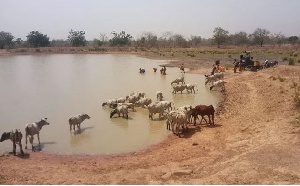 Residents of Kpuntaliga and Kulaa share water with animals
Residents of Kpuntaliga and Kulaa share water with animals
Residents of Kpuntaliga in the Northern Region have been hit with a severe water crisis which is draining their pocket and exposing them to potential water borne diseases.
Even though the Northern Region is known for its perennial water crisis, particularly during the dry season, the situation at Kpuntaliga has become dire.
The struggle for the scarce resource robs residents of productive man hours as they sometimes spend most part of the day in search of water for domestic use.
In most rural communities in the Northern region, streams and dams are the only sources of water. However, during the dry season these water bodies dry up leaving residents to walk longer distance to access water.
Residents of Kpuntaliga, a farming community in the Sagnarigu District of the Northern region are no strangers to this phenomenon. The community is without a dam and the only source of water there is a stream which is even farther away from the village.
During the rainy season, women of Kpuntaliga do not have much trouble searching for water as the streams are usually filled to the brim.
But as the rains depart and the dry season is ushered in, the streams begin to dry up and residents begin to wander from community to community in search of water.
This is the situation residents of Kpuntaliga and other communities currently find themselves in. The women of Kpuntaliga travel about 3km to Kulaa, the closest village with a dam, to get water.
During times like this, the women of the community have two options; they either trek on foot or they rent a tricycle to draw water from the Kulaa dam.
I met Alhassan Alima at the dam who came from Kpuntaliga in a tricycle she rented from Sanguli, a neighbouring community, to draw water. She tells me they rent the tricycle, popularly called motorking, at the cost of GHC15 for every trip. They load the tricycle with two drums and ten gallons and will be required to pay extra if the containers exceed the required number.
“We went to Saguli to rent the motorking. We don’t have one in our village. We pay GHC15 for every trip we go. We carry two drums and ten gallons and if you wish to use more than the ten gallons you have to pay for the extra gallons. We rent the tricycle twice a week so every week we spend GHC 30,” Alima explained.
Other women in the community spend same amount or more and those who cannot afford the cost of renting the “motorking” trek on foot to and from the dam.
This means in a month they spend at least GHC120 to access water from the dam which also serves as the source of water for cattle and other domestic animals.
The animals defecate and urinate in the water, but the people say they are left with no choice but to depend on the dam as it remains the only source of water for them.
Another woman who is a resident of Kulaa lamented over the health implications of sharing the water with the animals.
“The animals urinate and defecate in the dam but what can we do. We wish a separate source of water could be created for the animals because this not healthy for us,” she said.
According to her they have no means of treating the water before drinking or using it for other domestic purposes.
“They gave us nets to filter the water before use, but we don’t have them any more so when we fetch it home we drink it like that. Only God will protect us against any sickness,” she prayed.
Apart from the health implications of the water crisis, the economic burden it comes with leaves the women penniless even before the arrival of the next rains when water will be in abundance. Alima tells me they sell their farm produce and spend all the money accessing water.
The sad part of it, according to Alima, is the women bear the brunt of the crisis more, as most of the men there don’t contribute to the cost of renting the tricycle.
“It’s a big challenge to us because we sell our farm produce and spend everything on getting water for the family. When we run out of money we carry the water on our heads. We usually go two times in the morning and once in the evening. The dam is very far and anyone who is not used to doing it cannot access water on foot. Our husbands don’t care. Some of them don’t even know how we get money [to pay for the tricycle] to fetch the water,” she lamented.
Last year, the Member of Parliament (MP) for Tamale North, Alhaji Alhassan Suhuyini provided Kpuntaliga and three other communities in the area with polytanks and supplied them with pipe borne water until the rainy season.
Issahaku Alhassan, an opinion leader at Kpuntaliga said the intervention of the MP gave them a huge relief, but they are not out of the woods yet. He therefore appealed to government and to the Sagnarigu Assembly to come to their aid by providing them with a dam.
Efforts in the past to provide the people with a reliable source of water have not yielded positive results.